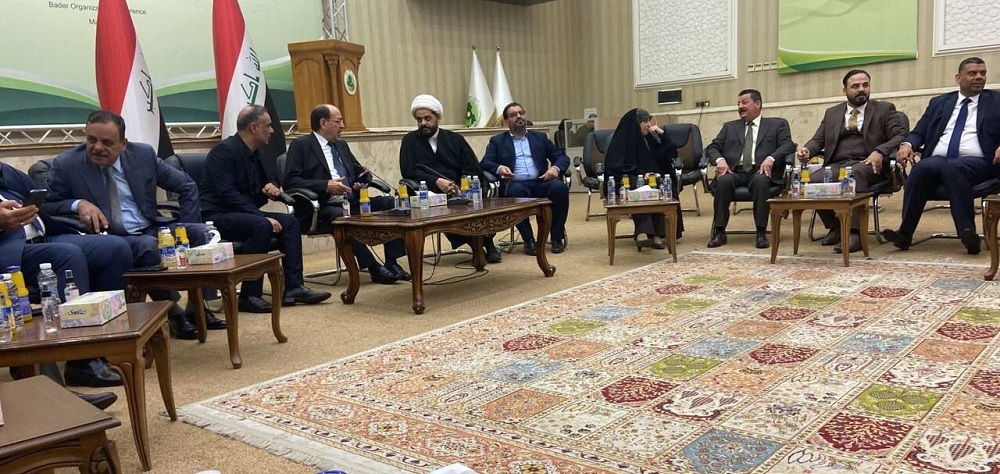To this end, Fadi al-Shomari, of National Wisdom Movement, on Monday in a Twitter message declared the agreement and expressed hope about naming a president and resuming the parliament sessions. Sumeria news network reported that the members of the new coalition have reached agreements on some issues, among them the candidacy of Mohammed Shia al-Sudani for the post of prime minister. However, the coalition will not start a dialogue with Sadrist Movement as the latter rejected any negotiations to end the limbo. The parliament session will be held on Tuesday, September 27, to resume its activities. The most important point is that the election law will be rewritten and elections will be held one year after. The agreements in the new coalition come while in recent days, some officials of the SCF had announced the readiness of the Shiites to negotiate with the Sadrist Movement in order to defuse political tensions. They also said that they do not insist on the candidacy of al-Sudani as the only option for the prime minister and other parties can name their candidates.
The agreement on al-Sudani comes as in recent days rumers suggested naming a new candidate for the PM post. So far, however, no one was named as an alternative to al-Sudani. Some parties push for current PM Mustafa al-Kadhimi stay but the Coordination Framework is strongly against this idea.
It seems that with the new coalition that brings together the Shiites, Sunnis, and Kurds, the path to election of a new PM is smoother and if not specific development takes place in the upcoming days, crisis will finally end after a year. Additionally, during a meeting with the lawmakers, al-Sudani elaborated on his government's plans.
The all-Shiite SCF decision not to negotiate with Muqtada al-Sadr is that he is not ready to enter a coalition with the bloc and is strongly oppose to premiership of its candidate al-Sudani. Two months ago, when al-Sudani was named, Sadrist supporters stormed the parliament with a green light from al-Sadr and stayed in the streets for weeks to block SCF candidate from taking the post. Al-Sadr has shown that he is not committed to any political solution and only wants to dissolve the parliament and hold early elections, a demand that none of the factions have agreed to and even the Supreme Court has expressed its opposition to it. Therefore, there is no point in continuing negotiations with a person who insists on his positions and is not willing to back down.
Ambiguity in positions of some political factions
Although the Kurdish leaders and those of Sovereignty bloc are ostensibly aligned with the SCF plans, they show some contradictory behavior in practice. After the elections, the KDP coalesced with al-Sadr but after the latter's walkout from the politics, it announced readiness to cooperate with the Shiite alliance. However, these days it is walking a fine line. On the one hand, its representatives said they have joined the new coalition led by the SCF and on the other hand they claimed this party will not join any government without Sadrist Movement. Earlier, similar contradictory stances were made by the KDP leaders who called for Sadrists to be part of a new government though they voiced their opposition to dissolution of the parliament— a demand al-Sadr made.
After Sadrists' collective resignation from the parliament, their 73 seats went to the SCF. Therefore, insistence on Sadrist presence in the government has no aim but perpetuation of the crisis. Al-Sadr himself asserted that the lawmakers of Saerun parliamentary bloc will not return.
Another obstructionist party is Sovereignty bloc, a former ally to al-Sadr and a current member of the SCF-led coalition. The SCF pushes for quick restart of the parliament sessions but Mohammed al-Halbousi, speaker of the parliament and Sovereignty bloc leader, shows no serious will and procrastinates invitation of the members of the parliament for resumption of the sessions. Reports suggest that so far 200 requests from representatives of political factions have been submitted to his office but al-Halbousi is procrastinating for unstated reasons. Like Sadrists and the Kurds, al-Halbousi is opposed to al-Sudani and wishes for prolonged crisis until dissolution of parliament and holding snap elections. Despite the fact that al-Sadr is standing out of the politics, he is advancing his destructive plans behind the scenes in association with his allies in the parliament.
The important factor impending the efforts to form a government in Iraq is that the rival factions not only have no cooperation but also try to challenge and foil their rivals' plans. Actually, there is no trust that can lead them to a consensus. For example, Sadrist Movement is struggling to block premiership of SDF candidate more than working to form a government of its control. As long as such intentions are characteristic of the political leaders, Iraq will not see formation of a strong government capable of leading the country out of the crisis to stability.
Iraqis are closer to election of a president and a PM more than ever
with their new alliance and the coming days are decisive for the people
and political parties to see if they can bring the political instability
to an end or obstructions by some groups would perpetuate the crisis.
/129

